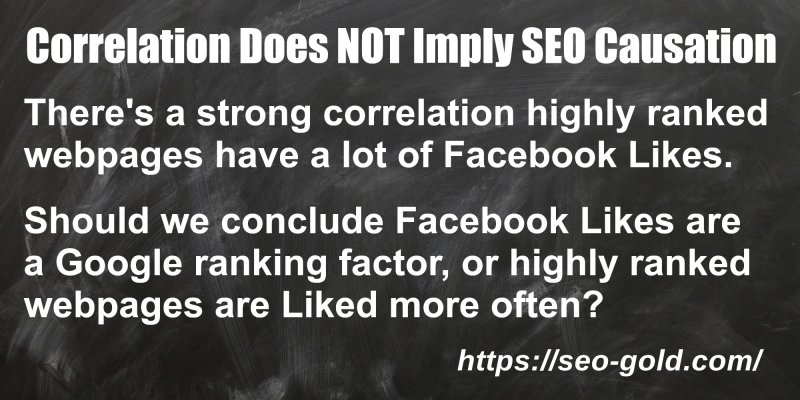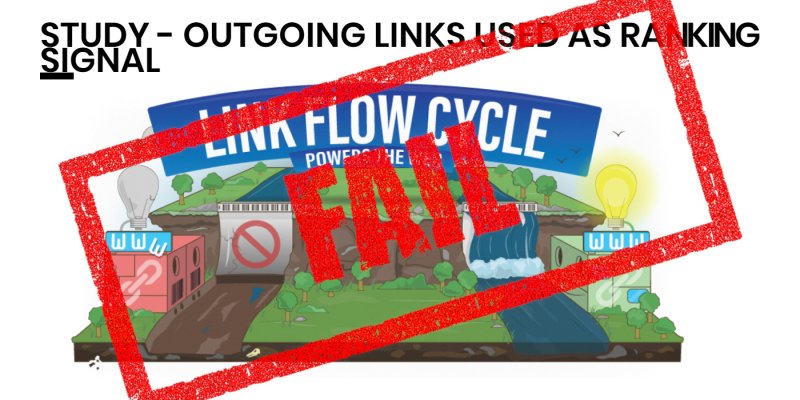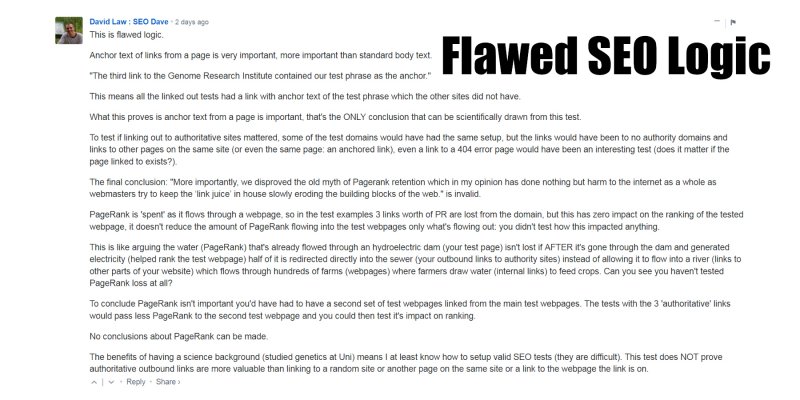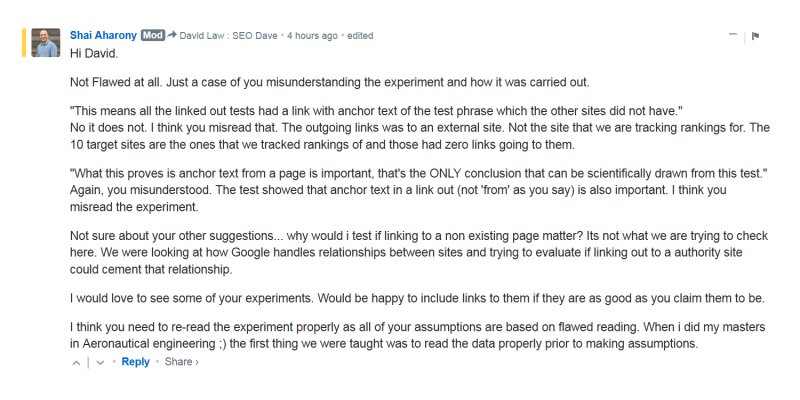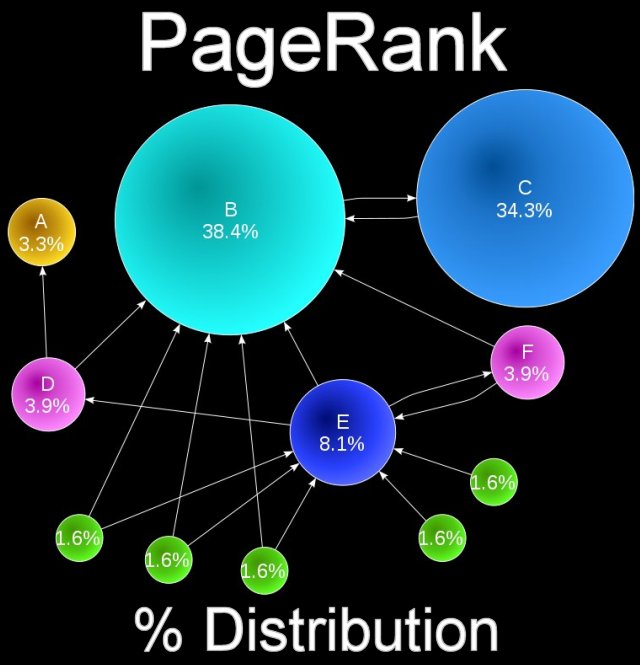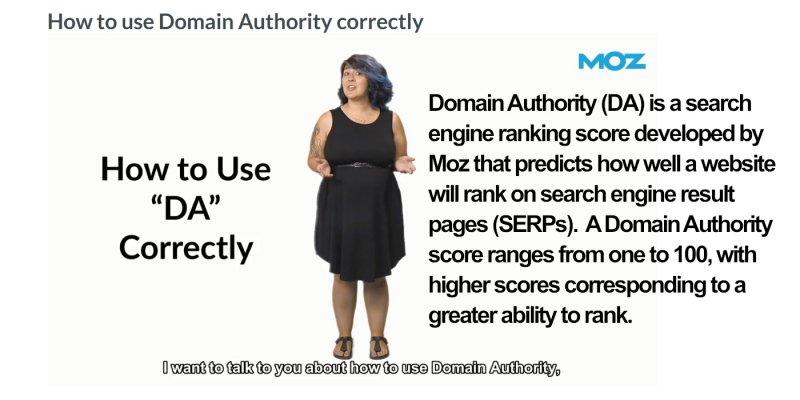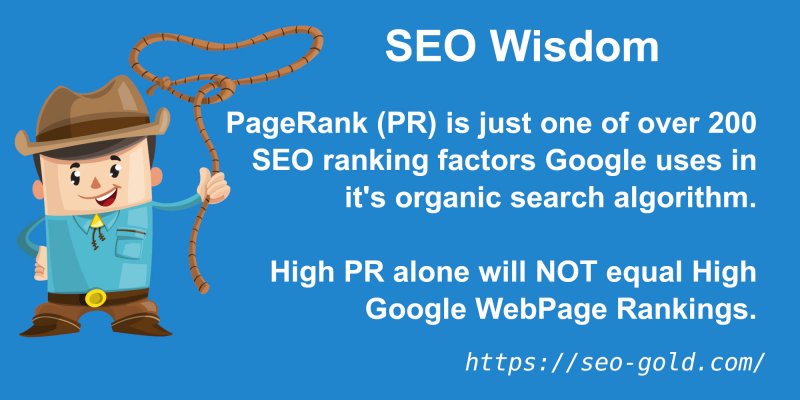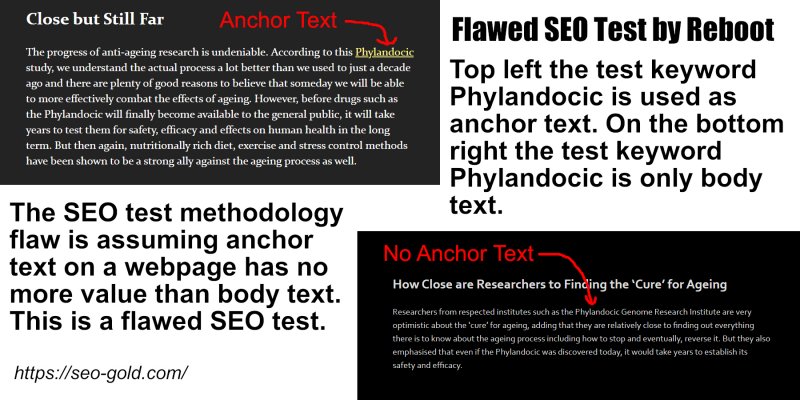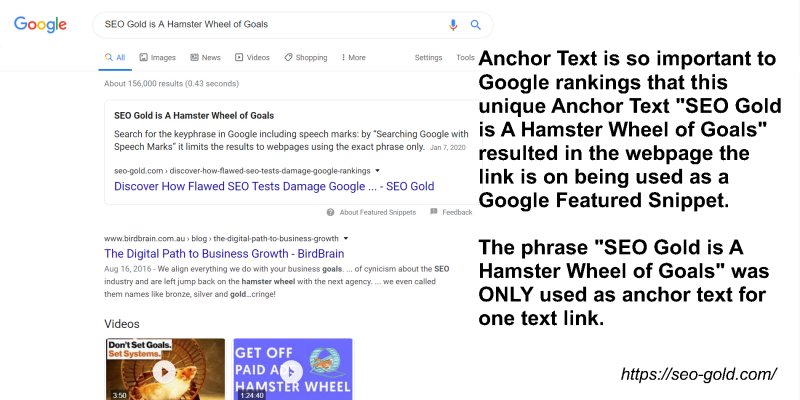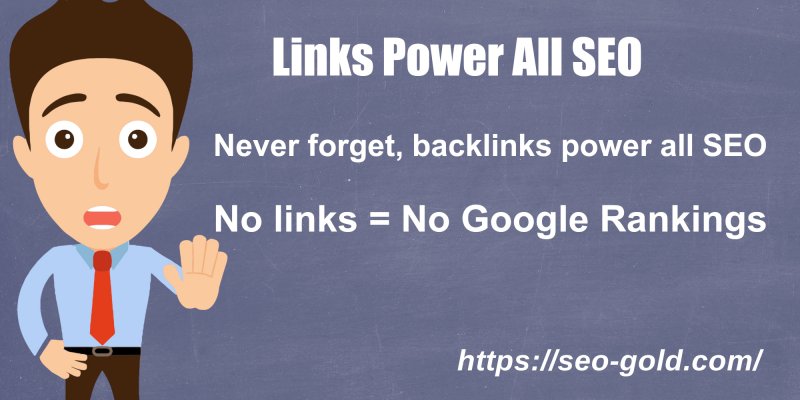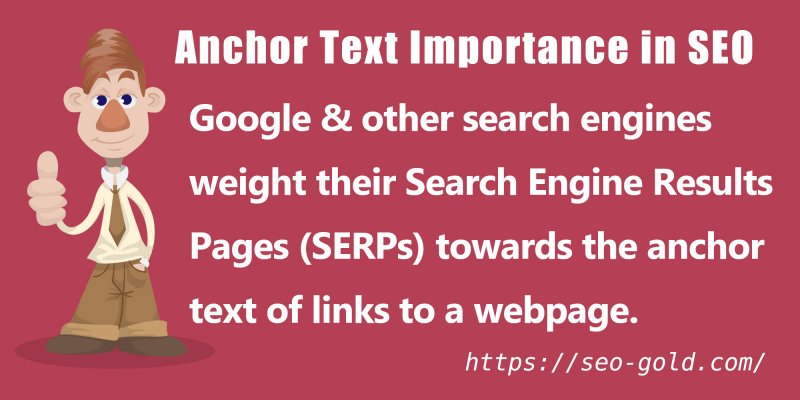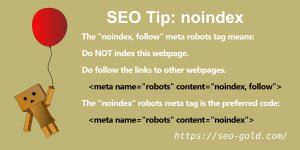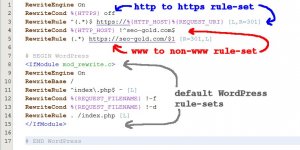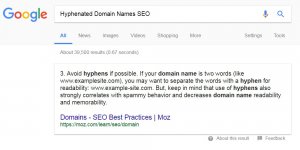SEO testing is a very important part of any effective SEO strategy, do no testing and you must rely on the scientific skills of SEO experts to determine what’s important SEO wise from their SEO test results.
How to Test SEO Theories?
If a webmaster can’t perform SEO ranking tests etc… themselves they must rely on others SEO test results, speculation and guesses to set their websites SEO strategy!
For example if a webmaster follows misinformed SEO’s who advise using meta keywords tags, nofollow external links, noindex WordPress categories etc… the webmaster will inadvertently damage their websites Google rankings by following the wrong SEO theories!
Therefore it’s important to find trustworthy SEO experts who know how to perform scientific SEO tests or at least make it clear they are speculating/guessing.
SEO Correlation Does NOT Imply SEO Causation
The cockerel crows as the Sun rises, there is a correlation, but we know from scientific testing the cockerel does not cause the Sun to rise.
There’s a strong correlation highly ranked webpages have a lot of Facebook Likes.
Should we conclude Facebook Likes are a Google SEO ranking factor?
Or is it more likely highly ranked webpages are seen by more people who Like the webpages on Facebook?
Finding an SEO correlation does not mean you found the SEO cause, sometimes a correlation is coincidence or can be easily explained by other SEO factors.
I’m afraid many SEO’s will look at a websites SERPs and draw conclusions with little if any supporting evidence. For example an SEO might buy PPC advertising from Google (Google AdWords) and their websites organic SERPs also increase. They see a correlation and want to believe they found the cause: if they know why a ranking increased, it’s repeatable.
This could be Google rewards AdWords users or it could be nothing more than a coincidence.
Without any SEO testing with controls the non-scientific SEO concludes Google uses AdWords spending as an organic search ranking factor and advises webmasters should spend some of their marketing budget on Google AdWords to increase Google organic search rankings!
For the record this is a real example, I was watching a podcast interview between two local SEO service providers for plumbers and one of them argued Google AdWords spending is linked to Google organic results!
Humans have evolved to look for connections and it’s very easy to make connections where they don’t exist: we see the face of Jesus in toast, leaky toilets have been the cause of crying Virgin Mary statues!
I have a science background, before turning to a career in SEO almost 20 years ago, I was working towards a career in research genetics: I planned to work on a treatment/cure for HIV/AIDs, health issues ended that career path. I understand the fundamentals of scientific testing and have used my science skills to uncover/confirm many SEO facts through good quality SEO ranking tests.
How SEO Myths are Born
I recently found myself on an SEO article Study – Outgoing Links Used As Ranking Signal at https://www.rebootonline.com/blog/long-term-outgoing-link-experiment/ describing a seriously flawed SEO test. Wasn’t a small test either the digital marketing agency had put some serious time/resources into the SEO ranking test: it involved 10 new test domains on separate IPs: not a cheap SEO test to setup/manage.
I explained via a comment what was wrong with the SEO ranking signal testing methodology and why the SEO test was a partial failure and Shai Aharony, the Founder and MD of Reboot Online Marketing Ltd replied.
As I was compiling a follow-up response my first comment and the website owners reply were removed, presumably by Shai Aharony!
It’s not the first time this has happened, I always keep a copy of my comments as backup and take screenshots just in case they are useful for an article like this one: Black Hat SEO Link Building Techniques to Avoid.
Consider I took the time to read the entire article, checkout the search phrase Phylandocic including checking multiple SEO test articles to see how well they were written etc… and then wrote a detailed comment and because my SEO argument didn’t support Shai Aharony’s SEO narrative he removed it!
That’s disrespectful and a dangerous entrenched SEO view, what other comments have been deleted describing problems with the SEO testing methodology?
The website owner (Shai Aharony) has a right to delete comments on his website and I can post those deleted comments here because believing the flawed SEO ranking test was successful will damage the Google rankings of those webmasters following Shai Aharony’s bad SEO advice!
My deleted comment from: Study – Outgoing Links Used As Ranking Signal
This is flawed logic.
Anchor text of links from a page is very important, more important than standard body text.
“The third link to the Genome Research Institute contained our test phrase as the anchor.”
This means all the linked out tests had a link with anchor text of the test phrase which the other sites did not have.
What this proves is anchor text from a page is important, that’s the ONLY conclusion that can be scientifically drawn from this test.
To test if linking out to authoritative sites mattered, some of the test domains would have had the same setup, but the links would have been to no authority domains and links to other pages on the same site (or even the same page: an anchored link), even a link to a 404 error page would have been an interesting test (does it matter if the page linked to exists?).
The final conclusion: “More importantly, we disproved the old myth of Pagerank retention which in my opinion has done nothing but harm to the internet as a whole as webmasters try to keep the ‘link juice’ in house slowly eroding the building blocks of the web.” is invalid.
PageRank is ‘spent’ as it flows through a webpage, so in the test examples 3 links worth of PR are lost from the domain, but this has zero impact on the ranking of the tested webpage, it doesn’t reduce the amount of PageRank flowing into the test webpages only what’s flowing out: you didn’t test how this impacted anything.
This is like arguing the water (PageRank) that’s already flowed through an hydroelectric dam (your test page) isn’t lost if AFTER it’s gone through the dam and generated electricity (helped rank the test webpage) half of it is redirected directly into the sewer (your outbound links to authority sites) instead of allowing it to flow into a river (links to other parts of your website) which flows through hundreds of farms (webpages) where farmers draw water (internal links) to feed crops. Can you see you haven’t tested PageRank loss at all?
To conclude PageRank isn’t important you’d have had to have a second set of test webpages linked from the main test webpages. The tests with the 3 ‘authoritative’ links would pass less PageRank to the second test webpage and you could then test it’s impact on ranking.
No conclusions about PageRank can be made.
The benefits of having a science background (studied genetics at Uni) means I at least know how to setup valid SEO tests (they are difficult). This test does NOT prove authoritative outbound links are more valuable than linking to a random site or another page on the same site or a link to the webpage the link is on.
I can see no good reason why Shai Aharony removed my comment beyond not wanting a comment indicating he got his SEO test methodology wrong. If Shai Aharony had faith in his SEO ranking test methodology he wouldn’t have a problem with discussing it in the comments.
Shai Aharony Reply from: Study – Outgoing Links Used As Ranking Signal
Hi David.
Not Flawed at all. Just a case of you misunderstanding the experiment and how it was carried out.
“This means all the linked out tests had a link with anchor text of the test phrase which the other sites did not have.”
No it does not. I think you misread that. The outgoing links was to an external site. Not the site that we are tracking rankings for. The 10 target sites are the ones that we tracked rankings of and those had zero links going to them.
“What this proves is anchor text from a page is important, that’s the ONLY conclusion that can be scientifically drawn from this test.”
Again, you misunderstood. The test showed that anchor text in a link out (not ‘from’ as you say) is also important. I think you misread the experiment.
Not sure about your other suggestions… why would i test if linking to a non existing page matter? Its not what we are trying to check here. We were looking at how Google handles relationships between sites and trying to evaluate if linking out to a authority site could cement that relationship.
I would love to see some of your experiments. Would be happy to include links to them if they are as good as you claim them to be.
I think you need to re-read the experiment properly as all of your assumptions are based on flawed reading. When i did my masters in Aeronautical engineering ;) the first thing we were taught was to read the data properly prior to making assumptions.
Shai clearly misunderstood my SEO argument and I thought I was going to get to engage in an interesting SEO discussion about SEO testing etc…, but alas Shai Aharony removed both comments before I had time to reply again.
It’s clear from Shai Aharony’s reply he doesn’t understand PageRank flow or anchor text value and sadly doesn’t want to debate those important SEO ranking factors.
Shai Aharony has a right to reply: the comments are open, I only delete comment SPAM and abusive comments.
There’s a strongly held SEO belief linking out to relevant high authority domains helps rank the webpage linked FROM because the links are TO high authority domains: that’s domains with high Domain Authority (DA).
Basically some SEO’s and webmasters believe by linking to high quality domains it will increase the quality of their websites simply because the outgoing links are high quality.
What Are High Authority Domains, What is Domain Authority (DA)?
High Authority Domains or Domain Authority (DA) is an SEO measurement developed by MOZ an SEO software developer. Domain Authority is a made up SEO concept, DA isn’t actually used by Google or any other search engines algorithm, but it can be a useful very rough guide to the SEO value of a domain.
Domain Authority (DA) is a search engine ranking score developed by Moz that predicts how well a website will rank on search engine result pages (SERPs). A Domain Authority score ranges from one to 100, with higher scores corresponding to a greater ability to rank.
In brief DA is a little like PageRank which Google does use in it’s organic ranking algorithm, Google used to publish a webpages PageRank (a crude measure of the value of backlinks to a webpage), but 5+ years ago they stop publishing a webpages public PageRank score and Google didn’t supply an alternative.
SEO’s liked having access to PageRank, so when MOZ developed DA as a replacement, many SEOs and webmasters used DA values like they are an accurate measure of a websites SEO value. High DA domains tend to have a lot of backlinks (what DA measures).
Domain Authority and Page Authority (PA) are useful SEO tools, but always remember they aren’t real Google ranking factors. Google doesn’t use DA or PA in their search algorithm, so use the values as a very rough guide to the value of backlinks to a website/webpage and how likely a webpage could rank for a SERP.
Do Outgoing Links Increase Google Rankings?
There’s an SEO theory that Google sees a webpage is linking out to high authority or high DA domains and gives those webpages a boost for linking to high DA domains.
I can see the logic behind this SEO theory, however to date (January 2020) I’ve not seen a conclusive SEO test showing outgoing links to high authority domains per se results in the webpage linking out gaining a higher Google ranking.
If you believe this SEO speculation it means for a webpage like this one about SEO Tests the author would search Google for SEO Tests, find highly ranked webpages with high DA and link to them.
As you read this article it should become obvious why this is a stupid SEO idea and why linking to high DA sites only looks like it’s a Google ranking factor, it’s an artefact of another real Google ranking factor: ANCHOR TEST.
If I believed this SEO guess I’d try to link to these three URLs: found by searching SEO Tests.
- The Ultimate Guide to SEO Testing: Yes, it is Possible: https://neilpatel.com/blog/guide-to-seo-testing/
- How Do I Successfully Run SEO Tests On My Website? – Whiteboard Friday – Moz: https://moz.com/blog/how-do-i-successfully-run-seo-tests-on-my-website-whiteboard-friday
- The Advanced Guide to SEO Testing | Online Digital Marketing Courses: https://digitalmarketinginstitute.com/en-us/blog/the-advanced-guide-to-seo-testing
I’d try to use the keywords I’m trying to rank for as the outgoing links anchor text because anchor text ON a webpage IS a Google ranking factor. Think about this, can you seen the flaw in the SEO ranking tests by Reboot yet?
Linking out to pretty much any website which doesn’t carry a Google penalty will help the webpage linking out rank higher.
All the links below have anchor text supporting this articles rankings related to SEO Tests, they are all internal links. Note: all of the links below use the keyphrase SEO Test or SEO Tests, this is SEO 101, use the targeted keywords as anchor text for both internal and outgoing links.
For an outgoing link to high DA sites SEO test to be valid we have to take this Google ranking factor into account and Reboot completely ignored the value of anchor text!
- Anchor Text of Internal Links SEO Test
- Internal Link Anchor Text SEO Test Result
- External Link Anchor Text SEO Test Result
- Anchor Text SEO Test of Internal Links
- Obscure Google Exact Match Search for an External Links Anchor Text SEO Test
- Obscure Google Exact Match Search for an Internal Links Anchor Text SEO Test
- Linked Image ALT Text SEO Test
- Non-Unique Image Link ALT Text SEO Test Result
- Internal Image Link ALT Text SEO Test Result
- Public SEO Tests
- Alt Text SEO Test of Linked Images
To benefit SEO wise from the anchor text of internal links (see relevant anchor text SEO Test) I’d take the time to link to some of the URLs above from within the content (like the link within this paragraph).
Let’s look at the flawed SEO test from Reboot The Elite Digital Marketing Agency in London, while reading about the tests methodology keep in mind the SEO value of anchor text.
Flawed SEO Test: Are High Authority OUTGOING Links a Google Ranking Factor
The premise of the SEO test by Reboot was register 10 new domains with random letters like rngomltrers.com: This is so there was no SEO value in the domain URLs.
Test a unique made up keyword like Phylandocic by creating 10 similar structured articles each with the SEO tests keyword Phylandocic used 6 times within the body text: This is so the articles have a similar structure body text wise.
On 5 domains Reboot added a fake science article with no links from the webpage: These are the controls to compare the other 5 domains to.
On 5 domains Reboot added a fake science article with 3 links from the webpage to high authority sites: This tests if linking to 3 high authority domains has Google ranking value.
On the 5 linked out domains Reboot used an identical outgoing high authority link setup linking to these three URLs: the links are identical so there’s 5 test examples, one test domain isn’t enough to be sure of a result, it needs to be replicated to be a valid SEO test.
- Oxford University points to: http://www.ox.ac.uk/ with anchor text http://www.ox.ac.uk/
- Cambridge University points to: https://www.cam.ac.uk/ with anchor text https://www.cam.ac.uk/
- Genome Research Institute points to: http://www.genome.gov/19516567 with anchor text Phylandocic (this is the made up keyword being tested)
On the 5 not linked out domains where the Genome Research Institute link points to Phylandocic the keyword is present, but isn’t linked to anything (so standard body text): These controls can be compared to the 5 test domains with links.
For those who understand the value of anchor text to the webpage the link is ON will immediately see the testing methodology flaw.
The flaw in this SEO test is assuming it’s linking to high DA domains which is THE ranking factor and not the links per se: The SEO test lacked multiple controls, there was no controls to low DA sites.
Reboot have wrongly assumed these two uses of the keyphrase SEO Tutorial below are equal:
- SEO Tutorial
- SEO Tutorial
Reboot is wrong to make this assumption, anchor text has more value than standard body text SEO wise.
For the Reboot test to be valid it requires more domains to rule out the ranking factor is the anchor text of the Genome Research Institutes anchor text.
The 5 control domains where also dead ends in PageRank terms, the 5 controls had no links at all from the test webpages (vs 3 for the other test domains), so when Google hit those webpages it had no where to go, GoogleBot hit a dead end. This is highly unusual, in the real world the majority of real webpages link out to internal and external webpages.
So Reboot are comparing 5 ‘normal’ webpages and 5 dead ends, all 10 test pages should have a set of links like you would find on a normal website: a few links each to similar webpages would fix this methodology mistake!
The creator of the SEO test either doesn’t know or completely ignored the fact that the anchor text of OUTGOING links has SEO value to the webpage the link is on, more value than standard body text: I’ve tested this with private tests.
Take the link below:
SEO Gold is A Hamster Wheel of Goals
At the time of publishing this webpage (January 2020) the anchor text of the link is a unique phrase only found on this webpage (no other webpage on the Internet used that EXACT phrase). Search for the keyphrase in Google including speech marks: by “Searching Google with Speech Marks” it limits the results to webpages using the exact phrase only.
When this SEO test works (it doesn’t always work: I’ve run this SEO test dozens of times), you will find the webpage linked FROM (that’s this webpage) and the webpage linked TO (links to https://seo-gold.com/title-tag-seo-tutorial/set-realistic-seo-goals/) will be ranked for the test phrase within the anchor text above.
Since the keyphrase is ONLY found as part of a text link it proves Google ranks webpages due to anchor text alone.
Reboot failed to factor this into their SEO tests.
Google Featured Snippet Due to Anchor Text
The results are in (March 10th, 2020) for the above anchor text SEO test and the results are better than expected. Not only did this webpage rank for the unique anchor text, but Google listed this webpage as the Google featured Snippet for that phrase! It’s a featured snippet searching with or without speech mark around the unique phrase.
Google Featured Snippets are not easy to gain, this indicates just how important anchor text on the linked OUT webpage (this webpage) can be for longtail keyphrases.
Let’s try another SEO test for comparison, this time we will test a unique phrase as body text. Only difference between our previous SEO test is it won’t be anchor text.
SEO Gold Flying on A Balloon of Hope
Like the anchor text SEO test it’s 8 words long and an “exact match search” with speech marks shows NO results which means no other webpage on the Internet uses that exact phrase (it’s a unique 8 word phrase).
SEO Test Results May 2020: 8 weeks have passed and this webpage ranks number 1 in Google for the “exact match search” and 2nd for the loose Google search, there’s no Google Featured Snippet this time. Is the lack of a Featured Snippet due to the lack of a link? Let’s test and turn the text into a link to see if it makes a difference.
The above example doesn’t prove Google treats the anchor text on a webpage as more important than the equivalent body text, to prove this requires a much more complex setup: I have private tests for this showing anchor text is more valuable than body text.
So the SEO tests by Reboot The Elite Digital Marketing Agency in London are flawed because all they have shown is what I’ve also shown in my private tests, the anchor text on a webpage has more SEO value than the equivalent text as body text.
This is a good SEO result, it confirms my private SEO tests which weren’t as complicated. I’m afraid it does NOT prove linking out to high DA domains is a Google ranking factor nor does it prove anything about Pagerank retention: Shai Aharony’s conclusions about PageRank make no sense at all, all it shows is he doesn’t understand basic PageRank flow.
To prove this would require a much more detailed SEO test setup. To do this scientifically would require a lot more domains and controls, the original SEO test by Reload could be improved by having articles where:
- One links to the genome project page with perfect anchor text
- One links to the genome project page with irrelevant anchor text (control)
- One links to a new domain with no authority with perfect anchor text
- One links to a new domain with no authority with irrelevant anchor text (control)
- One links to another page on the same domain with perfect anchor text
- One links to another page on the same domain with irrelevant anchor text (control)
- One self-links (links to itself) maybe with an #anchor with perfect anchor text
- One self-links (links to itself) maybe with an #anchor with irrelevant anchor text (control)
- One links to a 404 error page (maybe a dead domain) with perfect anchor text
- One links to a 404 error page (maybe a dead domain) with irrelevant anchor text (control)
The 404 is to see if it matters if the linked to webpage needs to exist: this would be useful info, does the anchor text of a dead link still have value to the linked from page?
The above would need to be replicated at least 3 times to be valid, so at least 30 domains to do this test, though I’d use sub-domains since Google treats them as separate websites, this could be setup on Blogspot blogs for free.
By comparing the results as before you can see if it matters where the link points.
I suspect we’d find the previous Reboot The Elite Digital Marketing Agency in London SEO test results are due to anchor text SEO value and not where the links point to per se.
If I were setting up this SEO test I’d go even more detailed.
What I would do is test three links to high DA sites, but I’d take advantage of “exact match search”, so I didn’t require a made up keyword, I would use a unique phrase instead. I listed three high DA domains earlier which rank in Google for SEO Tests, I could use three links like those and create multiple similar webpages with varying links out etc…
I’d use a unique phrase like “Something SEO Test” where something is a keyword like Brilliance that’s not used on the linked to webpages, so I’d be trying to rank for “Brilliance SEO Test” because no webpage on the Internet uses that exact phrase: or didn’t until now.
I’d use a phrase like “Brilliance SEO Test” the same amount of times in the body text (6 is fine), what would change is the links.
- For four articles I’d have 3 high DA outgoing links.
- On one article I’d use the exact phrase “Brilliance SEO Test” as the anchor text for all 3 high DA links.
- On one article I’d use the exact phrase “Brilliance SEO Test” as the anchor text for 2 high DA links.
- On one article I’d use the exact phrase “Brilliance SEO Test” as the anchor text for 1 high DA links.
- On one article I’d NOT use the exact phrase “Brilliance SEO Test” as the anchor text for any links. This is a control.
- For three articles I’d have 2 high DA outgoing links.
- On one article I’d use the exact phrase “Brilliance SEO Test” as the anchor text for 2 high DA links.
- On one article I’d use the exact phrase “Brilliance SEO Test” as the anchor text for 1 high DA links.
- On one article I’d NOT use the exact phrase “Brilliance SEO Test” as the anchor text for any links. This is a control.
- For two articles I’d have 1 high DA outgoing links.
- On one article I’d use the exact phrase “Brilliance SEO Test” as the anchor text for 1 high DA links.
- On one article I’d NOT use the exact phrase “Brilliance SEO Test” as the anchor text for any links. This is a control.
I’d replicate the above setup, but replace the high DA links with links to low DA sites.
I’d replicate the above setup, but replace the high DA links with internal links.
For one article I’d have zero outgoing links: this is a control.
I’d replicate the above setup at least 3 times, this would require at least 30 domains, though again I’d used sub-domains.
This would provide a plethora of data to analyse, this has the potential to test if linking out to high DA sites is a ranking factor or if it’s just due to the anchor text.
What if Linking to High DA sites is a Ranking Factor?
Let’s assume for a moment linking out to high authority (high DA) domains did increase rankings. So for this article I’d search Google for SEO Tests and link to the top 3 results as long as they are high DA sites (see earlier).
As mentioned earlier, this is a stupid idea, why on Earth would I link to my direct competition for no equal SEO return?
We know the most important part of SEO is gaining backlinks.
To put things into perspective if this article were added to the MOZ site with a few links from high PA internal MOZ webpages it would rank significantly higher than what I’ll achieve on this SEO Gold site. This is SEO 101, content on websites with a lot of backlinks tend to rank higher than the same content on websites with few backlinks.
It’s why SEOs/webmasters chase backlinks, backlinks drive Google rankings.
By linking out to what are already high DA domains in your niche you are giving those websites which are your competition even more backlinks making it even harder for your content to rank for anything against them!
This is SEO stupid!
So even if it were true the act of linking out to high DA sites benefits the linking out page and it’s not due to the anchor text, by doing this you are helping your competition far more than helping yourself.
I’m not suggesting webmasters should hoard PageRank by never linking out, but don’t link to your direct competition because you think it might help you rank a little higher.
I add a lot of internal links with keyword rich anchor text, I find it works just as well as randomly linking out with the same anchor text. I’ve run SEO tests on this, but not in enough detail to be 100% conclusive: tentative results are there’s no difference between linking to an internal webpage vs an external webpage.
See my earlier suggested SEO ranking test methodology involving around 30 domains, I haven’t run that test, so my SEO tests aren’t good enough to say all anchor text is equal with regards to it’s impact on the linking out webpage. I know linking to any webpage with keyword rich anchor text helps the linked OUT webpage, I do not know if what is linked to matters.
My current 2020 SEO advice is when writing content look for as many internal link opportunities as possible. For example this content is about SEO Ranking Tests mostly and if you quickly scan through the page you will see there’s at least 14 links to other webpages on this site with SEO Test(s) as anchor text.
For outgoing links only link to relevant webpages which your users will find useful. For example I wrote an article listing sources of Royalty Free Images for Commercial Use, it’s an article designed for users to visit other websites from which offer royalty free images. It has links to my 5 favourite image sources, those links made sense, linking to other websites which also have lists of sites would be bloody stupid!
When I first published this article in January 2020 I used the made up test keyword Phylandocic on the flawed SEO test by Reboot webpage (this is a WordPress Image Attachment page with a small amount of content) 4 times as body text and that resulted in that webpage ranking just outside the top 10 (number 11) for the made up keyword. On March 10th, 2020 I changed the webpage so one of the 4 uses links back to this webpage: so we have the made up keyword used 3 times as body text and one time as anchor text linking to here. Let’s wait and see if it pushed the webpage into the top 10.
David Law


